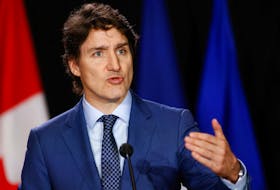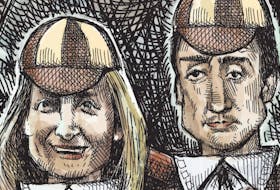Brenda Oslawsky
Guest Opinion
The federal election results will once again raise the issue of electoral reform. The last two federal elections saw 39 per cent of the popular vote give majorities, or more correctly false majorities, to first the Conservatives and then the Liberals. Many provincial governments lately have formed majorities with similar percentages of popular vote. But this federal election, that figure could sink to a record low of something like 36 per cent delivering a majority of seats to one party.
The flip side of this coin is that this means that the majority of those who voted will cast a ballot that elects no one. In our last federal election, only 48 per cent of those who cast a ballot affected the outcome of the election. That means that 52 per cent of those who voted didn’t elect anyone of their choosing to represent them. This is increasingly feeding the cynicism of those who feel that their vote doesn’t matter — because it likely doesn’t matter. This is even more the case with younger voters who are less likely to vote for one of the two traditional parties.
According to CBC online, electoral reform is one of the issues brought up often during the 2019 campaign, but the organizers for the federal debate on Monday had no question or space for it at all. Elizabeth May managed to get in a reference to a ‘fair voting system’ but not everyone will equate that with changing our current voting system to a proportional one.
If we get a minority government, which is also a strong possibility, it will be one of a number across the country right now. Federal minority governments have done good things in the past — they’ve brought in public health care and the Canada Pension Plan. Unfortunately, under our current electoral system, these minority governments usually don’t last long because at an opportune moment a snap election can be forced with the hopes of one of the parties winning a majority government.
Minority governments with our current system are essentially comprised of parties in waiting — waiting for power. And, contrary to popular belief, minority governments are not coalition governments that operate similar to governments with proportional representation. Coalition governments with proportional representation (PR) are comprised of parties that negotiate and sign long-term agreements; while with minority governments, the parties often negotiate each piece of legislation separately with no agreement in place. Countries with PR have elections no more often than non-PR countries and knowing an election is unlikely to deliver a majority or absolute power to any single party, parties are committed to making government work for the people who elected them.
This would be a good time for those outside the federal campaign to reaffirm their commitment to the fundamental democratic principle — that if someone votes, they elect someone of their choosing to represent them. This issue was central to the rise of the Green Party here on the Island that are currently Opposition in a minority provincial government.
A proportional voting system would reduce the polarization by electing people from all political stripes in every region. A proportional voting system would ensure that more women were elected and would help to have our national diversity reflected in our parliament. It would ensure that in the future, all voices are at the table. Two parties, the NDP and the Greens, have said that bringing in PR would be a condition of supporting a minority government. So here’s hoping that proportional representation can be added to the list of ‘good’ things that collaborations under minority governments have brought to Canada.
Brenda Oslawsky is a member of Islanders for Proportional Representation and on the executive of Fair Vote Canada.









